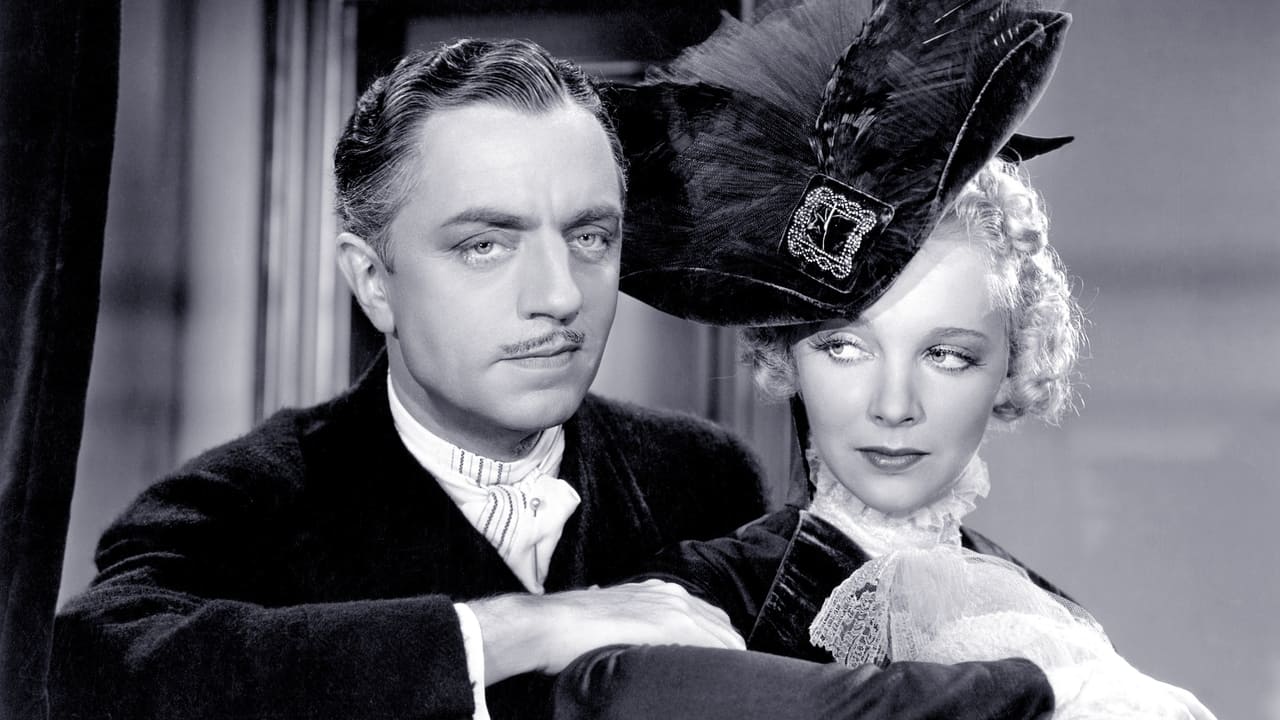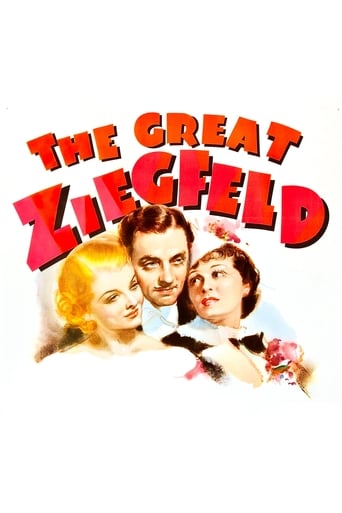Glucedee
It's hard to see any effort in the film. There's no comedy to speak of, no real drama and, worst of all.
ChanFamous
I wanted to like it more than I actually did... But much of the humor totally escaped me and I walked out only mildly impressed.
Deanna
There are moments in this movie where the great movie it could've been peek out... They're fleeting, here, but they're worth savoring, and they happen often enough to make it worth your while.
Francene Odetta
It's simply great fun, a winsome film and an occasionally over-the-top luxury fantasy that never flags.
JohnHowardReid
Copyright 19 April 1936 by Metro-Goldwyn-Mayer Corp. A Robert Z. Leonard production. New York opening at the Astor, 8 April 1936. Australian release: 7 October 1936. 20 reels. 180 minutes.COMMENT: Come late! — that's my advice. In fact, come an hour late. The story surrounding the musical numbers is the most dreary sludge ever churned out by a Hollywood hack, while the dialogue is easily the most tedious, banal, repetitious chatter we have ever been forced to sit through in a major studio production. When the musical numbers do come on — a whole hour in — and we see no less than six all at once — our spirits start to lift. True, the music is poorly arranged, and the first number, "If You Knew Susie", disappointingly pedestrian in both singing and staging; but then the eye-popping spectacular "Melody" is unveiled — quite dwarfing the next four items, though they are pleasing enough in themselves. The rest of the movie is naturally an anti-climax, though a darn sight more entertaining than that first dreary hour!As usual, Luise Rainer is a positive pain in the duodenum, but the rest of the players do an excellent job — especially considering they are likewise handicapped by the banal dialogue. They don't revel in it like Miss Rainer whose mouth slobbers into clichés with an abandonment that borders on indecent. Perhaps her knowledge of English is poor and she doesn't realize what utter garbage she is chewing into with such relish, but the director should have stopped her, or at least put her wise. But then she wouldn't have won that Academy Award, would she? Interesting that a performance so highly prized in its day is now regarded by almost everyone as utterly worthless and ridiculous. It's the sort of eye-rolling, voice-choked histrionics that give "old" movies their wholly undeserved bad name.Another problem which dates the film for modern audiences is that photographer Oliver Marsh chose to lens it in very soft focus, — a fashion that was already going out of style when The Great Ziegfeld was originally released.Fortunately, Leonard's direction has some effective moments, while the set designers and costumer have really excelled themselves.As already mentioned, the high point of the movie is the "Pretty Girl" number in which Gerstad pulls off one of the greatest camera tricks in all cinema history. The mind just boggles, your eyes stare out of your head in utter disbelief. When Dennis Morgan finishes the song and the camera cranes back and you realize the camera hasn't been standing still all the time but climbing up and up this fantastic pyramidal column, it's totally overwhelming. One of the most dazzling moments in movies! Sad that the rest of the picture isn't a tenth as colossal.
utgard14
MGM's epic biopic of theatrical producer Florenz Ziegfeld, starring William Powell in the title role. As with most Hollywood biopics, liberties are taken with the facts. Since this was made in the Golden Age of Hollywood, the intention is to portray Mr. Ziegfeld in the best possible light. If it were made today, the opposite would be true and all his faults would be emphasized (probably to the point of slander). I'll leave it to you to decide which is the better approach. Anyway, the movie covers Ziegfeld's rise as a Barnum-esque showman to becoming one of Broadway's most successful producers with his Ziegfeld Follies show. Along the way he attracts many women and marries two of them (Luise Rainer, Myrna Loy).It's a spectacle made in the grand Old Hollywood fashion, heavy on melodrama and lavish musical numbers. Powell is fine in the lead. I have no idea how closely he "gets" Ziegfeld here, as he seems very much like William Powell's usual screen persona to me. He would reprise his role as Ziegfeld a decade later in 1946's Ziegfeld Follies (also from MGM). Luise Rainer is terrific in her Oscar-winning role as Ziegfeld's first wife, Anna. Myrna Loy is a little miscast as Billie Burke but it's hard to argue against any opportunity to see Powell and Loy on screen together. The rest of the cast includes solid supporting players Frank Morgan, Virginia Bruce, Ray Bolger, Reginald Owen, and Nat Pendleton. A. A. Trimble does a spot-on impersonation of Will Rogers.It is a bit overlong. The first half could have done with some trimming. Still, a fine cast keeps things interesting and those musical numbers are dynamite. Dennis Morgan's "A Pretty Girl is Like a Melody" number is one of the highlights. The film was nominated for seven Academy Awards with three wins, including Best Picture and Best Actress for Rainer. Its award wins are the subject of debate for some today, who argue it is one of the least-deserving Best Picture winners. That's kind of laughable when you think about it, as the Best Picture Oscar rarely goes to the most deserving film. That was true then and is even more true today, in my opinion. It's definitely something you'll want to try out if you are a fan of classic Hollywood and all its glitz and glamour. They don't make 'em like this anymore.
TheLittleSongbird
Knowing several people, on and outside of IMDb, who consider The Great Ziegfeld one of the weakest Best Picture winners, that didn't stop me from seeing it anyway. To me though, while it's not flawless and not the best film of the year it was still incredibly well-made and entertaining stuff and from personal view it is nowhere near one of the worst Best Picture winners.The Great Ziegfeld agreed is overlong with a draggy and at times uneventful first half and half an hour could easily have been trimmed. And more could have done with the relationship between Ziegfeld and Billie Burke which appeared late in the film and didn't feel developed enough, almost like an afterthought.However, The Great Ziegfeld is very lavishly mounted, with photography that's both beautiful and clever, sumptuous costume design and some of the most handsomely gorgeous sets of any 30s musical. Other pleasures are the marvellous and very well-staged(without being too overblown) songs with A Pretty Girl is Like a Melody being an absolute show-stopper, a script peppered with humour and heart and the mostly poignant story. Standout scenes were Fanny Brice's charming My Man, Ray Bolger's witty dancing to My Follies Girl, Luise Rainer's heart-breaking telephone(justifiably famous) and especially A Pretty Girl is Like a Melody with its clever photography and perhaps one of the best uses of a staircase in a film. The direction is adept and the performances are great, with William Powell suave personified and especially Luise Rainer who is the epitome of charm and grace, capable of a good range of emotions as seen in the telephone scene. Fanny Brice, Frank Morgan, Ray Bolger are all memorable, while Myrna Loy is underused she's hardly wasted either.Overall, a well-made, entertaining and very good film and well worth the look. 8/10 Bethany Cox
SnoopyStyle
During the 1893 Chicago World's Fair, sideshow barker Flo Ziegfeld Jr. (William Powell) struggles to promote strong man Eugen Sandow. He beats his rival Billings by smart marketing on Sandow. It's the start of his long career of promoting vaudeville acts as he gains success and loses big over and over again. His first wife is French star Anna Held (Luise Rainer) who he signed stealing away from Billings. She gains publicity with Flo sending 20 gallons of milk for a fictional beauty treatment everyday. His next star is the alcoholic Audrey Dane who breaks up his marriage. Borrowing from Billings again, he produces a new show with Broadway star Billie Burke (Myrna Loy) and later marrying her and having daughter Patricia.This is a long giant Hollywood extravaganza to proclaim its love of Ziegfeld. It has all the lavish production that such a thing entails. It can get long-winded at 3 hours but it's not a small life. In fact, it fits the man to have a long big production. It does bring out the up and down life of a vaudeville hustler and the old idea that bigger is always better. It's the perfect big production for the producer who loves big production. William Powell does a fine impresario of hucksterism and imagine making.

